Cornel West Lecture 5 – America Allegro Molto Vivace
Lecture Five took place at St Cecilia’s Hall on Tuesday 14th May, and was chaired by Professor Jo Shaw, Salvesen Chair of European Institutions and Head of Edinburgh Law School.
Below is a summary of the lecture, followed by a response by PhD student in European Theatre, Olivia Fischer.
You can watch the Lecture recording on YouTube. Make sure to join in the conversation by leaving a comment below!
As Prof. West took the stage, he remarked on this fifth lecture that he was ‘having more fun each time’ and with each opportunity to ‘challenge’ and ‘unsettle’ those in attendance. With this Lecture, ‘America Allegro Molto Vivace’, he began, we had ‘finally made our way to what used to be called the New World, now just another part of the world’: the USA.
Prof. West continued, ‘you can imagine, for someone like myself, to be able to stand here on an international stage and talk about the American Empire, that […] I have to say something that includes myself’, so while it might be a ‘strong critique with a lot of righteous indignation’, it cannot be ‘an absolute condemnation’. The same ‘tradition that produced me’, West remarked, ‘the jazz-soaked philosophy that flows from within the doings and sufferings of Black people on the underside, and in many ways, at the centre, of the shaping of the American Empire, is one that is as American as many of the crimes that have been committed against Black people, Jewish people, working people and so forth’. Central to the Lecture, and to this discussion of the Age of America, then, is the tacit recognition that the good and the bad are deeply intertwined, that catastrophe and catharsis are cyclical and related phenomena.

John Coltrane House
Indeed, West drew upon the importance of sight in experiencing (and acting upon) that recognition, not only of barbarity but of beauty – quoting Henry James’ 1901 letter to Robert Louis Stevenson, he recalled that ‘no theory is kind to us that cheats us of seeing’, and emphasised that a jazz-soaked philosophy implores us to see more ‘deeply, clearly, synoptically, analytically’, but also to ‘connect it to feeling things more deeply and intensely’, and, true to pragmatism, the ‘indigenous philosophical tradition of the American Empire’, to embrace the ‘primacy of phronesis and practical reason’, to ‘[act] more courageously’.
Likewise, Prof. West evoked the words of Theodor Adorno, who in Minima Moralia, wrote that the ‘splinter in your eye is the best magnifying glass’. This splinter, he proposed, acts as the metaphorical nexus between the notions of intellectual humility and self-scrutiny that have arisen in earlier lectures, and the suffering inside of each of us – the ways in which ‘all of us must come to terms with forms of catastrophe’ whether personal, political, economic, or spiritual. Whatever lens we use to view the world with, the splinter symbolises, will bring its own shortcomings and blind spots: our challenge is to understand this and to mobilise our intellectual and moral resources against them, in order to see more completely.
a jazz-soaked philosophy implores us to see more ‘deeply, clearly, synoptically, analytically’, but also to ‘connect it to feeling things more deeply and intensely’, […] to embrace the ‘primacy of phronesis and practical reason’, to ‘[act] more courageously’
Vision emerges too, Prof. West remarked, in the words of George Eliot, whose novel Middlemarch is subtitled a ‘Study on Provincial Life’, the same type of thinking that a jazz-soaked philosophy seeks to unravel. Paraphrasing Eliot, ‘if in fact you are ever able to have a keen vision and feeling of ordinary human life, it would be like hearing the grass grow […] we should die from the roar on the other side of silence’. This, he continued, suggests that ‘if we ever think we can see everything’ within the ‘multi-layered forms of suffering, misery, wounds, bruises, and scars’ – what Eliot names the frequencies, and Ralph Ellison calls the ‘lower frequencies of the unbelievable forms of suffering in the world’ – that this might be ‘too much’ to bear and to contend with. The question that such thinking inspires, then, is how we might ‘use our timing just like a jazz-woman or a blues-man, to see just enough, to get at enough of the truth, [where] the condition of that truth telling is allowing that suffering to speak of others and ourselves’, to ‘walk that tightrope, in rhythm, with syncopation’ without being overcome.
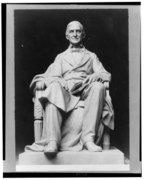
Ralph Waldo Emerson
Considering the inception of the American colonies and the United States as it became a new nation, Prof. West suggested that we overlook the degree to which the country’s early years were ‘shaped by an inferiority complex with Europe’ – this was the argument of Ralph Waldo Emerson’s ‘cultural declaration of independence’ in 1837’s ‘The American Scholar’, in which he argued America must break from the ‘courtly muses of Europe’ and that Americans must think and see ‘through [their] own lens’. This marks a recognition of how the beginning of the ‘American experiment was a neo-European moment’, one fundamentally shaped by those settlers ‘coming to terms with un-European circumstances and traditions’, including the ‘indigenous peoples, enslaved Africans, working classes, the wilderness’, all of which resisted the colonial project in various ways. These beings and entities whose subjugation was essential to the coherence of the national project helped to formalise the notion of the ‘frontier’, which West named the ‘dominant myth in the making of the American Empire’, a concept articulated by Frederick Jackson Turner as the ‘line of demarcation between the civilised and the so-called savages’. This idea is enmeshed too in the language of the Declaration of Independence, in which an ‘empire of liberty’ was constituted ‘over and against the savages’. Nonetheless, Prof. West reminded the audience, these early days of expansion and self-mythologising reflect a spirit of pioneering sensibility, of moral regeneration, and ‘unbelievable levels of vitality’ and ‘energy’ – traits we must understand as inextricably tied to forms of violence ‘rationalised by the discourse of innocence’. Returning to the metaphors of sight that he began the lecture with, West quoted James Baldwin: ‘innocence itself is the crime, because it doesn’t allow us to see’.
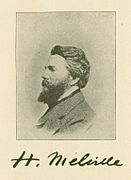
Herman Melville
One cannot get to the writings of O’Neill or Eliot without recognising the two different sensibilities of American literature modeled by Emerson, the ‘book of fire’, and Melville, ‘the rose garden of thorns’ – and these two temperaments and influences, West noted, will return in Lecture Six with his discussion of Toni Morrison, Baldwin, and Du Bois. These two intellectuals deal expansively with the ‘three pillars of jazz: catastrophe, swing, and improvisation’ in their grappling with the emergencies of their time. West remarked that Melville, for instance, stood with Frederick Douglass, as he reflected upon the legacy of John Brown, a man who showed a ‘willingness to die in the name of a truth he didn’t just speak, but as a Christian freedom fighter who believed that those Black babies who were being crushed in Virginia had the same status as his own sons’, and thus transfigured his moral belief into radical abolitionist rebellion at Harper’s Ferry in 1859.
Reflecting on Emerson’s influence, Prof. West emphasised remarks made on the centenary of his birth, 25 May 1903. William James, on that day, argued that Emerson was a ‘real seer’, an ‘artist’ whose ‘medium was verbal, [whose] material was spiritual’, and whose works would ‘cheer people’s hearts and strengthen their souls and liberate them’. John Dewey, in turn, stated that Emerson offered a means of ‘transcending the debate between philosophy and poetry’, the same debate that we encountered in Lecture One. As West argued, this marks Emerson’s unique ability to contemplate ‘catastrophe and structures of domination’, to ‘wrestle with a distinct form of American loneliness’ that (as described by Alexis de Tocqueville in his studies of American democracy) marks a type of suffering with ‘spiritual quietude’, and inability to ‘cultivate the kind of philia that constitutes quality relationships’ and the ‘capacity to love’. These are the same issues evoked in T.S. Eliot’s poetic depictions of the ‘hollow men and women’, the ‘spiritual wastelands’ of the early twentieth century.
The question becomes, ‘what is it about this early neo-European experiment, in non-European circumstances’ that marks a shift from the Old World, and what will it provide to the ‘global discourse of what it means to be human’? More importantly: ‘what forms of paideia will flow therefrom?’.
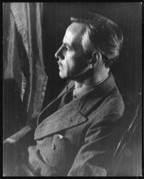
Eugene O’Neill
Turning to O’Neill, Prof. West noted that his work still ‘hurts me every time I read him’, because it exemplifies and believes that ‘the fiduciary dimension of being human is not enough’. His 1939 play The Iceman Cometh is a ‘denial of all forms of faith, not just religious, but the fiduciary dimension, of any trust or faith whatsoever’, and is informed not only by the work of Nietzsche, but equally by the personal catastrophes O’Neill experienced in the deaths by suicide of one of his sons and his brother, and the attempted suicide of his other son. Drawing on a 1946 interview O’Neill undertook with Time magazine, West quoted: ‘I’m going on the theory that the US, instead of being the most successful country in the world is the greatest failure, because it was given everything’ but ‘hasn’t acquired any real roots’, exemplifying an attempt to ‘possess your own soul by possessing something outside of it’, but not fortifying anything internal, moral, or spiritual. O’Neill continued that America is the ‘greatest example of [the question]: “what shall it profit a man if he shall gain the whole world and lose his own soul?” – we had so much and could have gone either way’. The playwright, he believed, ‘must dig at the roots of sickness today […] the death of the old god and the failure of science and materialism to give any satisfying new one for surviving the primitive religious instinct to find a meaningful life in, and comfort its fear of death with’. From this we see, West argued, a model of the artists as a ‘physician of the soul, wrestling with the inability to provide meaning’ in a world perceived as spiritually empty.
Drawing on the opening to O’Neill’s play, West read sections from its opening scene:
LARRY: (Grinning) I’ll be glad to pay up – tomorrow. And I know my fellow inmates will promise the same. They’ve all a touching credulity concerning tomorrows. (A half-drunken mockery in his eyes) It’ll be a great day for them, tomorrow – the Feast of All Fools, with brass bands playing! Their ships will come in, loaded to the gun-wales with cancelled regrets and promises fulfilled and clean slates and new leases!’ […] ‘To hell with the truth! As the history of the world proves, the truth has no bearing on anything. It’s irrelevant and immaterial, as the lawyers say. The lie of a pipe dream is what gives life to the whole misbegotten mad lot of us, drunk or sober. And that’s enough philosophic wisdom to give you for one drink of rot-gut.
before suggesting that the play’s whole setting offers a symbolic rendering of the American Empire. In it, we see twelve characters fixed in inertia, immobility, unable to leave the saloon setting as they await the ‘messianic’ figure of Hickey, emblematic of the American salesman, of commodification, as he sells his fellow men ‘dreams’ – the ‘dream to actualise their memories of the golden days when they were full of themselves and able to live much more ordinary lives’. Such works evoke too F. Scott Fitzgerald’s 1925 novel The Great Gatsby, and its tragic titular hero who believes above anything else in the ‘green light, the orgiastic future that tomorrow will be better’, but who fails to see that the ‘past still haunts, beats back, is inescapable in its weight and gravitas, a past denied but never completely eliminated’. The ‘Last Harbour’ setting, West remarked, exemplifies the ‘frontier’ as there is nowhere else to go beyond it; yet that edge of the American project is mired in grief and despair, a moral and spiritual lacuna. That the character Willie later resolves to Larry to ‘sing a song’, however, suggests a hope in the role of eloquence, that music is a starting point for coming to terms with an age marked by barbarity and the demise of Europe.
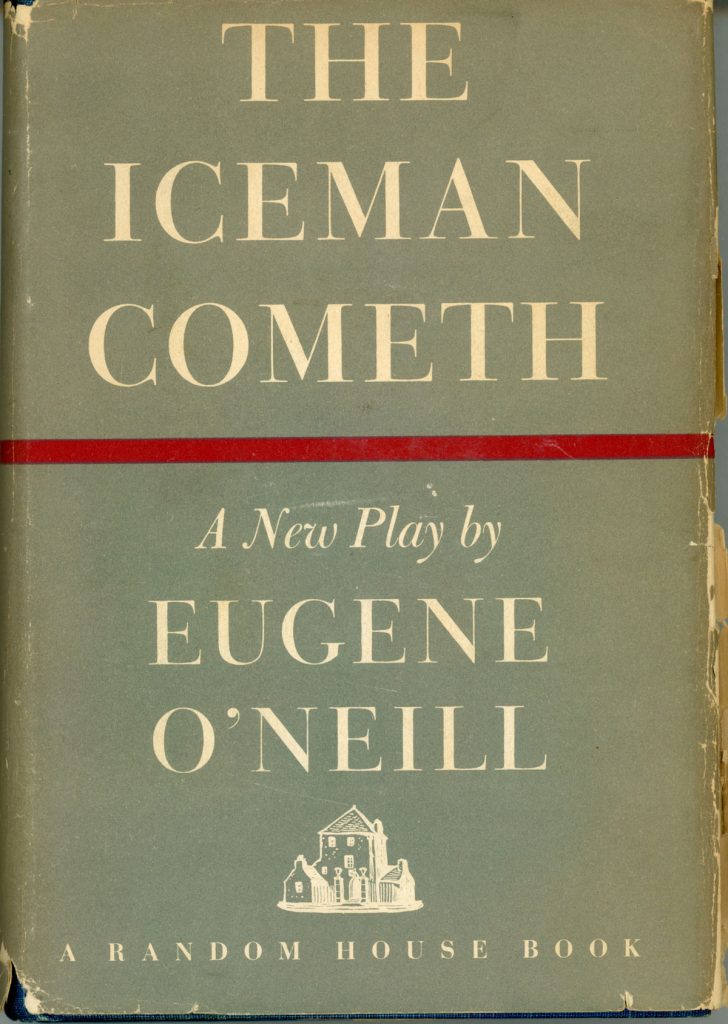
The Iceman Cometh
Perhaps, Prof. West continued, O’Neill is in fact trying to call into question the ‘very possibility of the Gifford Lectures’ and what they symbolise in the form of enquiry and education; his play, West continued, articulates that paideia has no place because ‘the truth itself kills’, because ‘self-knowledge destroys the self’, and that there is never a self ‘strong enough to deal with self-knowledge’ of that nature, and thus that paideia is foreclosed, leaving us no way out from despair. O’Neill hence grapples with nihilism in its ‘most concretised forms, in a civilisation where everything is for sale’, where our very bodies have been commodified and made fungible by the ‘vicious legacies of white supremacy, male supremacy, homophobia, transphobia, and regional arrogance’.
And yet, part of that wrestling with nihilism, with the catastrophic, he went on, is in recognising and attending to those legacies where they exist, in taking seriously that despair as a catalyst for something other, something more than what we have now. We see this, he argued, at the play’s end, in which Larry offers a ‘whisper of horrified pity [as] a long forgotten faith returns to him’ – what West terms a ‘rare moment of fiduciary presence’ in the text. Indeed, as Larry says, ‘Be God, there’s no hope […] Life is too much for me! I’ll be a weak fool looking with pity at the two sides of everything till the day I die!’, we find parallels with that same kinesis seen in Erasmus’ In Praise of Folly. So too, described as ‘looking with pity’, and being ‘[surprised at himself]’ for a mere moment, we see a Kairos-like glimmer of hope: Larry continues, ‘I’m the only real convert to death Hickey made here, from the bottom of my coward’s heart I mean that now’.
O’Neill grapples with nihilism in its ‘most concretised forms, in a civilisation where everything is for sale’, where our very bodies have been commodified and made fungible by the ‘vicious legacies of white supremacy, male supremacy, homophobia, transphobia, and regional arrogance’.
O’Neill reveals here, Prof. West posited, that a land of exceptionalism, one seen as a place of ‘unlimited possibility’, is in fact ‘part of the same train of nations and empires in place over time and space over centuries’, and will face the consequences and aftereffects of the violence that it reaps – legacies that we still witness today. This, West surmised, is a type of ‘soul-craft’, the interjection of paideia in a work of deep scepticism: the call to ‘intervene in such a way that you cultivate an individual and organised capacity to produce what Dewey says about Emerson – the belief in the identity of being a character’, a soul. This, he continued, is what these lectures are about: not academic discourse alienated from life, but about how ‘God talk’ can be informed in such a way that ‘human beings can choose integrity, honesty, decency, generosity, love, compassion, critical engagement – with a sense of laughter, and maybe with a little style’ – a sentiment met with enthusiastic applause.

T. S. Eliot
It’s here that Prof. West introduced Four Quartets, a collection of poetry by Lecture Five’s other towering figure, T. S. Eliot, whom he warmly described as ‘my right wing brother’, one emblematic of the Whitmanian ‘multitudes’ and incongruities evoked in Lecture Three, whose corpus must be contextualised both against the problem of his anti-Semitic beliefs, and his simultaneously ‘deep appreciation for the words of the everyday people’ in a time of broad social and political catastrophe. What, West asked, might Eliot have to say in the midst of the end of the Age of Europe and the devastation of global war?
‘Time present and time past
Are both perhaps present in time future,
And time future continued in time past.
If all time is eternally present
All time is unredeemable.’
Drawing on these lines, West remarked that they offer a Kairos moment of the ‘rose-garden’ sensibility seen in the works of Melville; they offer a moment of breakthrough, forcing us to respond creatively. Eliot’s words are not ‘epistemic’ but ‘existential’: ‘At the still point of the turning world. Neither flesh nor fleshless;/Neither from nor towards; at the still point, there the dance is/But neither arrest nor movement. […] Except for the point, the still point/There would be no dance, and there is only the dance./I can only say, there we have been: but I cannot say where’. Whereas O’Neill’s The Iceman Cometh seems unable to find a sustaining way out of nihilism of its time, Eliot’s verse suggests that there might be an escape through catastrophe, that ‘the way up’ is indeed the ‘way down’ too.
West read further: ‘There is, it/seems to us,/At best, only a limited value/In the knowledge derived from experience./The knowledge imposes a pattern, and falsifies,/For the pattern is new in every moment/And every moment is a new and shocking/Valuation of all we have been. We are only undeceived/Of that which, deceiving, could no longer harm. […] Do not let me hear/Of the wisdom of old men, but rather their folly,/Their fear of feat and frenzy, their fear of possession,/Of belonging to another, or to others, or to God./The only wisdom we can hope to acquire/Is the wisdom of humility: humility is endless’. Eliot shows us too, West described, that it is not enough to merely invoke something, we have to prove it, learn from it – to implement it in our own rigorous self-critique and transfigure it into ethical action and a calling.
Reflecting on his favourite line in the poem, one he recalled discussing with his close friend, the late James Melvin Washington, ‘For us, there is only the trying. The rest is not our business’ – the rest, West continued, ‘cannot be deciphered’. What these lines reveal is a sincere attempt to cultivate the capacity to love, in a world in which love itself is a radical and ethical practice, our best means of moving beyond barbarism and hatred.
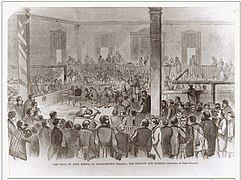
The trial of John Brown
It is this idea that leads directly into the jazz-soaked philosophy, and is sustained in Morrison, Baldwin, and Du Bois, who are to be discussed in the final Lecture. Quoting Eliot again, ‘The dove descending breaks the air/With flame of incandescent terror […] The only hope, or else despair/Lies in the choice of pyre or pyre–/To be redeemed from fire by fire’. This, West noted, evokes two forms of fire: the Pentecostal motif tied to ‘some notion not of revelation’ but ‘something that gives us a sense of transcendence beyond narcissism and hedonism’, and the fire driven by the market conditions of the world, in which one is set on ‘superficial fire’ that has ‘nothing to do with the deep frequency of your humanity’. So too, they might allude to the radical protest of John Brown evoked earlier in this lecture, the redemption of catastrophe through the catastrophic, or the ‘incandescent terror’ of a jazz-soaked philosophy that turns the soul from despair to hope.
Love, West concluded, is Eliot’s attempt to get out of the catastrophic – that which he mobilises with a sense of poetic swing, of a thorough improvisation that attends to and draws upon multiple traditions and registers. At the same time, this work is ‘inadequate’, much as ‘anything that we come up with will be in some sense inadequate’ too – and yet, he closed, it is incumbent upon all of us that we too work to do and to build something better than what we have inherited, to make the future better than the past.
Response by Olivia Fischer:
In years to come, when I think about this evening’s lecture, what I will most remember is a moment that I feel many of the fellow audience members might have overlooked. Certainly, the online audience would have missed it, as it was at the very beginning of the comfort break, once the live feed had been paused, and the in-house audience began to stretch their legs. Dr. Annahita Mahdavi West, professor, psychotherapist, and Professor Cornel West’s wife, had folded a white tissue and was dabbing at her husband’s forehead. It was a simple act of vulnerability and care that, in my mind, anchored this oratorical and philosophical giant. After an hour of riding the swells and swings of West’s lecture, this moment, my favourite moment, made him seem all the more human. This moment was a physical enactment of what West has described as one of the “drumbeats” of this series: the piety of his thinking and his being.
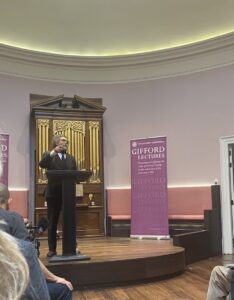
Prof. West speaking at St Cecilia’s Hall
When reflecting on American playwright Eugene O’Neill, West referenced the writer’s own piety: “My Master is Nietzsche, Nietzsche changed my life right after I tried to kill myself.” O’Neill is no stranger to catastrophe. He would attempt suicide in 1912 and a year later would be diagnosed with Tuberculosis. As his playwriting career was taking flight, he would lose both his parents and his older brother would drink himself to death in a three-year period. Later, one of his sons would die by suicide and the other would be unsuccessful in his own attempt. The youngest of his three children, his only daughter, would marry Charlie Chaplin and, due to the thirty-six-year age gap between the two, O’Neill would sever his relationship with her forever. O’Neill’s personal catastrophes would serve as inspiration for many of his plays, including A Moon for the Misbegotten, a play about the last few days of his brother’s life. But it is O’Neill’s tragedy, The Iceman Cometh, written in 1939, that West spoke on and later read from.
“My dear vanilla Irish blues man. I love this brother. He hurts me every time I read him,” said West of O’Neill. West attributes this to O’Neill’s utter denial of faith, not just religious faith but any faith whatsoever, particularly in The Iceman Cometh. On this matter, and as a fellow playwright, I must disagree with West. O’Neill may have denounced faith in his words both written and spoken, but in his actions, in O’Neill’s continued commitment to write – and not just write for himself, but for audiences for years to come – O’Neill must’ve had a few pockets of faith somewhere.
In the beloved classic Waiting for Godot by Samuel Beckett (another writer West invoked), Beckett asks the fundamental question: how do we spend our time whilst we are here? At the end of the play, upon learning that Godot will again not be showing up, Vladimir and Estragon consider suicide but decide against it, not having the rope to hang themselves with. In their final exchange Estragon says to Vladimir, his companion of fifty-odd years:
ESTRAGON: I sometimes wonder if we wouldn’t have been better off alone, each one for himself. We weren’t made for the same road.
VLADIMIR: (without anger) Nothing is certain.
ESTRAGON: No, nothing is certain.
Vladimir slowly crosses the stage and sits down beside Estragon.
VLADIMIR: We can still part if you think it would be better.
ESTRAGON: It’s not worthwhile now.
Silence.
VLADIMIR: No, it’s not worthwhile now.
Silence.
ESTRAGON: Well, shall we go?
VLADIMIR: Yes, let’s go.
They do not move.
Curtain.
This extract rang in my head upon West’s reciting of the final few pages of O’Neill’s play. Unable to return to the dreaming of the group, Parritt jumps off the fire escape. This action happens off stage, and most of the group are too preoccupied with their drinking and dreams to hear it – except Larry, who falls back in his chair, visibly shaken by the realization of Parritt’s death. In the stage directions, some of which West quoted directly from the text, O’Neill states:
LARRY: (A long forgotten faith returns to him for a moment and he mumbles) God rest his soul in peace.
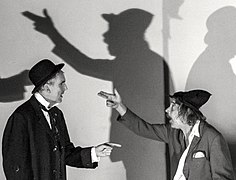
Vladimir and Estragon in Waiting for Godot
Larry is the singular character in the final scene who faces the disaster, the loss of innocence, the loss of a dream, and in that moment of despair he returns to a faith. Much like Gogo and Didi in Godot, in the moment of greatest despair, the momentary death of their dream, they too return to their faith, they continue to wait. And in O’Neill’s own work, he would continue to enact a faith by writing many more plays in his lifetime. O’Neill will not find the fire escape, nor the rope or the bottle, but the pen.
The wooden podium upon St Cecilia’s Hall’s elevated stage, housed by the spring pink walls of Scotland’s oldest purpose-built concert hall, is a far cry from the barren country road and tree that makes up Vladimir and Estragon’s post, or Harry Hope’s downtown New York tenement building, home to the group of alcoholics in The Iceman Cometh. But there are underlying questions that rumble and echo in all these worlds, and indeed in our inner and outer worlds too, that West is stirring up through his jazz-soaked philosophy. Perhaps for me the greatest answer to those questions, how we spend the time we have here and with whom, is no better answered than in that tender moment I had the privilege of witnessing between a husband and wife. Amongst the loudening applause and erupting conversations, there was a moment of true connection, and that gave me a momentary return to faith.




Recent comments